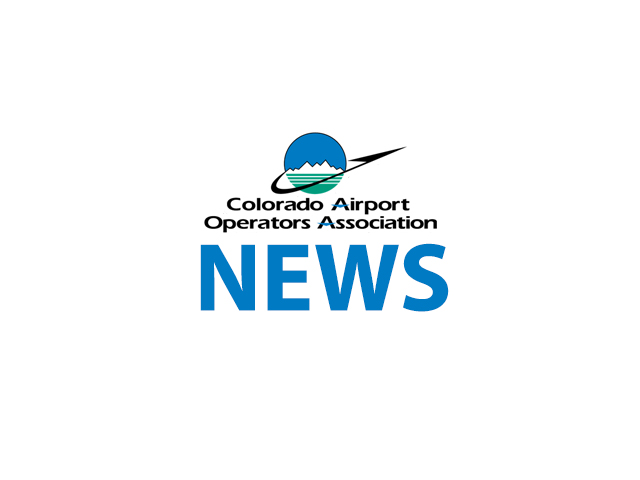USDA Efforts to Manage Wildlife Hazards at Colorado Airports
In an effort to provide important information to Colorado CAOA members, please feel free to forward this email highlighting the cooperative efforts between USDA-APHIS-Wildlife Services and CDOT-Division of Aeronautics (CDOT) within the state of Colorado to address wildlife hazard management for aviation safety.
One of the many roles of USDA-APHIS-Wildlife Services (WS) is to alleviate wildlife hazards at airports nationwide. Since 2006, the cooperative agreement between WS and CDOT has received national recognition and has become a pro-active model for other states in need of maintaining FAA compliance in regard to wildlife concerns. Since this cooperative program began, Colorado WS program has experienced an increase in interest and support for airport wildlife management. Over the last 7 years, WS assistance to airports has expanded from 10 airports to over 25 of the 76 public-use airports in Colorado.
Responsibilities of Colorado WS’ airport program are numerous and include, conducting Wildlife Hazard Assessments, Wildlife Hazard Management Plans, Wildlife Hazard Site Visits, federal and state permitting, habitat management recommendations, surveying, wildlife control, land-use planning, and establishing and maintaining working relationships with property owners adjacent to airports. All the while, complying with Federal, state, and local laws to provide our best service to each airport.
Below is a description of services that the WS program provides to Colorado airports each year:
Wildlife Hazard Assessments (WHA)
A WHA is a detailed evaluation of wildlife conditions at an airport, documented in a formal written report to the airport manager. This is a comprehensive 12 month study where data is collected through on-site observations, surveys, and data analysis. This study is necessary for a complete evaluation of all factors contributing to wildlife hazards specific to an airport, including seasonal wildlife occurrence and abundance.
Wildlife Hazard Management Plans (WHMP)
A WHMP is a document that describes the responsibilities, policies, and procedures to reduce wildlife hazards at airports. It provides guidelines and action plans to accomplish prioritized wildlife management objectives within defined time frames. Content requirements for the plan have been established by the FAA in 14 CFR Part 139.337 (f). The WHMP is a working document that must be reviewed annually. Most certificated airports in Colorado have an FAA-approved WHMP that is reviewed and updated annually by WS and incorporated in the airports’ Airport Certification Manual (ACM). This includes reviewing each section within the WHMP such as habitat management efforts and priorities, evaluating the responsibilities of the wildlife hazard committee members, ensuring that proper federal and state permits are current and included in the plan, and confirming that wildlife control procedures were utilized on the airfield to avoid a hazardous condition. Assessing each aspect of the plan helps airport management gain an understanding of where the problems are and what methods are most effective in alleviating the concerns.
Wildlife Hazard Management Annual Training
For certificated airports, the FAA requires airport employees involved in implementing an airport’s WHMP to receive annual training (14 CFR part 139.303). Non-certificated airports have requested this training as well, but it is not required. WS develops training courses each year in wildlife hazard management according to FAA Advisory Circular (AC) 150/5200-36. Upon completion of the training, the list of a list of airport personnel is provided to the FAA for verification during certification inspections.
Wildlife Strike Identification and Reporting
It is extremely important to the aviation industry to report “wildlife strikes”. Statistics are compiled by the FAA using data collected on the FAA Form 5200-7. The data collected helps develop management programs specific to their airports. WS helps in the identification of wildlife species that are struck, submits wildlife strike information to the FAA and provides recommendations to the airport.
Obtaining Federal and State Permits for Wildlife Control
Wildlife management on airports requires lethal and non-lethal techniques to reduce or eliminate threats to human safety or damage to aircraft and operations. State and federal permits are required in Colorado before certain species can be lethally removed or harassed from safety areas. WS assists airports with all permitting processes by completing permit applications and submitting required documentation.
Wildlife Control
Wildlife population management is often necessary to address immediate hazards to human health and safety caused by wildlife. WS possesses all the necessary permits and licenses to conduct direct control activities to reduce hazardous wildlife populations on/near airfields. This includes the use of toxicants and pesticides with a Qualified Supervisor Pesticide License and Firearms Certifications. Wildlife control is a necessary tool that airports can and do rely on WS to conduct on their airfields. Airport managers contact WS for non-lethal, as well as lethal measures on their airfield. For example, prairie dog control continues to be a priority for many airports in Colorado and management of populations on an airfield is difficult and time-consuming, yet imperative due to safety concerns. Prairie dogs pose an immediate threat by burrowing within safety areas as well as attracting numerous predators to the airfield including hawks, owls and eagles and coyotes which can cause significant damage to aircraft.
In conclusion, ALL Colorado airports are able to accomplish wildlife management objectives more efficiently and effectively when CDOT collaborates with WS. WS will continue to provide exceptional service to the Colorado airport system because of the increasing requirements, awareness and support of the program by airport managers.
Attached are some interesting highlights of the accomplishments of our wildlife hazard management program for Colorado airports during 2013. As always, thank you for your continued cooperation and support to ensure we are maintaining high standards to protect Colorado’s aviation community.
Sincerely,
Kendra Cross
USDA-APHIS-Wildlife Services
12345 W. Alameda Pkwy Ste 204
Lakewood, CO
303.236.5815 office
303.859.0399 cell
USDA Accomplishments 2013











